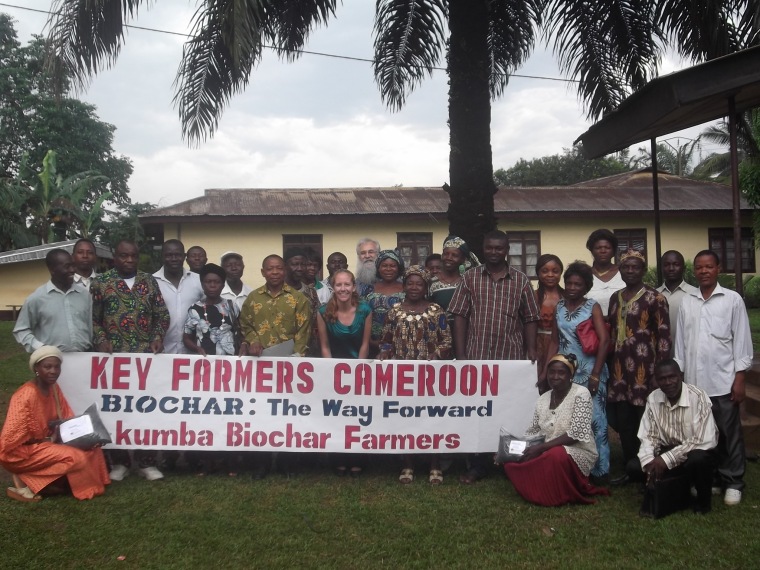 One of Cameroon’s main agricultural and food security challenges is the poor quality of the soils. Across the country soils are weathered, red and mineral depleted. Consequently, farmers employ slash and burn practices as a form of shifting cultivation to more fertile soils found in forested areas.
One of Cameroon’s main agricultural and food security challenges is the poor quality of the soils. Across the country soils are weathered, red and mineral depleted. Consequently, farmers employ slash and burn practices as a form of shifting cultivation to more fertile soils found in forested areas.
In addition, farmers are also heavily dependent on chemical fertilizers, which they often cannot afford. Lack of training and improper application of these chemicals can cause further damage to soil fertility and the ecosystem.
To address these issues, Key Farmers Cameroon has pooled its resources together in researching the best ways to help members improve poor agricultural soils. One method of soil amelioration Key Farmers Cameroon has researched in depth is the production and application of biochar.
What is Biochar?
Biochar is a solid charcoal soil amendment created through the thermal carbonization of biomass. Having been used in the Amazon basin by indigenous populations for over 2000 years, it is one of the crucial components of terra preta do indio; a very dark soil known for its fertility. Compared with the surrounding soil at archeological sites where terra preta has been found, these soils contain higher concentrations of nitrogen, phosphorous, potassium and calcium.[1] Glasser et al (2001) and Glasser B (2007)
Biochar improves the soil’s water and nutrient retention while also sequestering carbon. Aside from its soil fertility improvement properties, research has shown biochar has tremendous promise as a tool for carbon sequestration and carbon-emission reduction. By applying biochar in fields, farmer help lock carbon in the soil, which keeps it from being wasted in the atmosphere.
Given these qualities, biochar has potential to increase crop yields and improve food security while also mitigating climate change.
Key Farmers Cameroon is currently promoting the use of field waste, primarily maize stalks, palm branches and cassava stems to manufacture biochar.
Biochar Activities Summary
2008
December 2008, Key Farmers Cameroon and the Biochar Fund launched field trials testing the effects of biochar on crop productivity in Cameroon’s South-West Region.
The participants were Cameroonian subsistence farmers in Common Interest Groups (CIGs). The majority of which were women.Trials took place in fields around Kumba proper and the surrounding villages of Kake, Barombi Kang, Mambanda, Ikiliwindi, Teke, Mabonji, Mbalangi, Malende, Kossala, Ediki and Kendem.
In order to create the biochar, woody biomass was sourced in the form of logs and large pieces of wood from local farmers and sawmills. The bulk of the biochar was produced in dedicated “barrel-in-a-barrel” devices made from repurposed oil drums. Biochar production using this device has an efficiency of around 20% (1 ton biomass in as fuel, 200 kg of biochar out). One person can produce around 40 kg of biochar per day with a single device, in batches yielding up to 10kg of char per run.
Researchers chose to conduct the trials with maize because the crop can be planted and harvested twice in a single year. Even though maize is a staple crop, average yields are low, below 1.7 tons per hectare. Key explanatory factors for low yields include low soil fertility, poor farm management, lack of access to quality seeds and fertilizers, pests and diseases.
66 test plots were prepared, measuring 54 square meters and divided into 12 sub-plots. Maize was planted at a high density of 62,500 seeds per hectare. The maize used was obtained from the Rumpi Program run by the Cameroonian government.
For more information about results from Biochar Fund and Key Farmers Cameroon’s project, please see the article by Chris Goodall.
2012
In March of 2012, Key Farmers Cameroon conducted trainings with 20 rural subsistence farmer groups in Kendem Village of Manyu Division in the South West region. Promoting biochar as a robust way to improve soil quality, participants were taught how to produce and use biochar on nutrient depleted soils. Farmers that applied this technology reported increases in maize production, in some cases 150% or more.
Given the success of the field trials and training events in the Southwest region, Key Farmers Cameroon shared its expertise with farmers in the Extreme North region of Cameroon.
Sponsored by German International Corporation (GIZ) Maroua – Cameroon, Key Farmers Cameroon held a two week workshop, focused on biochar production from field stock and its uses to increase tree production. 45 nursery operators and tree farmers were trained in Biochar production using agricultural wastes, including corn and sorghum stalks and cow manure and applied it during tree planting in Maroua.
2014
Key Farmers Cameroon is currently exploring efforts to scale up biochar production for large scale commercial use.

